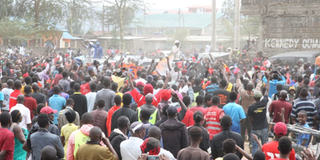Growing up in Nakuru with Raila’s legacy: A Gen Z reflection

Raila Odinga, leader of the Azimio coalition, is pictured with Kalonzo Musyoka, leader of the Wiper party, and other leaders at Mazembe Grounds in Kaptembwa, Nakuru Town West, during a rally on March 16, 2023.
Since the death of former Prime Minister Raila Odinga, I have seen videos on social media with captions such as, 'Unless you grew up in a household that idolised Raila, you cannot relate to the pain those people are going through.'
Others were captioned, 'Check on your parents who were Raila supporters; they are not okay.'
Having grown up with die-hard Raila supporters, I can confidently say that I understand the feelings of those on social media. I first became aware of 'the Enigma' after the 2002 general elections, when my grandfather said that Kibaki only won because of Raila's support.
He went on to describe how Raila and others had managed to topple the Moi regime, which had been in power for 24 year, something that no one had ever thought possible.
That was how I was introduced to Raila Odinga.
Gradually, I also started piecing together stories about his detention and his fight for liberation and multi-party democracy.
By the time the 2007 general election was approaching, even though I was not eligible to vote, he already had y vote. I remember that during the polls, he took an early lead. In our village, my grandfather and his friends had started drinking busaa and were happy about the resounding victory that lay ahead.
However, then Tharaka Nithi happened and Raila fell short of becoming president.
The mood quickly turned sombre, and some of them were too disappointed to bear it. I did not really understand the magnitude of what had happened, but I knew I was sad.
From that point onwards, I would say that I became a political fanatic and became very invested in the country's politics.
Growing up, you could always hear people in the village saying, 'We are waiting for Raila to show us the way,' particularly in relation to politics. To call him a kingpin would be an understatement, he was the embodiment of what was Nyanza region.
True to their word, people would wait like soldiers for orders from their commander on what to do. This reflected his long-standing influence on national politics, which I found at its peak when I arrived.
Then came the Gen Z movement, which ushered in a new era of fighting for accountability and social justice using smartphones, hashtags and peaceful protests. It was a movement that drew inspiration from none other than Raila Odinga.
Some even heard saying, “Agwambo, stay home. You have fought enough; now leave the fight to us”.
Unlike older generations who grew up under Moi's regime, experiencing the brutal KANU youth wingers and other atrocities and being too scared to speak their minds, here was a generation that was never afraid. They referred to themselves as fearless, and all of this was made possible by the father of the second liberation.
Raila Odinga may never have sat in State House. But for millions, he was the leader they chose time and time again, not for power, but for principle.
He fought. He lost. He rose again. He fought again. In doing so, he became more than a man. He became a memory, a myth and a movement.
Now that he is gone, it feels as though a chapter of Kenya’s political history has come to an end. But perhaps the flame still burns in the hearts of those he inspired: my grandfather, my parents, myself and, now, a new generation.
Rest well, Baba.


